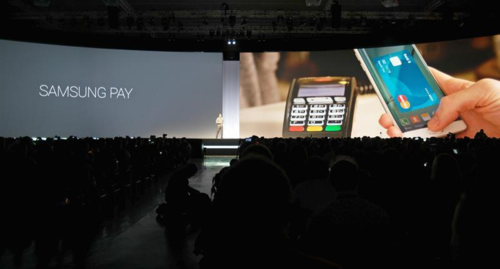
Samsung’s new mobile payment system,
coming this summer, will work even at the millions of old-fashioned
checkout terminals that don’t have a wireless connection. That solves
one of the big limitations of Apple’s mobile pay system, which only works at the 200,000 or so newer terminals in the U.S. that have been upgraded with wireless chips.
But Samsung’s solution faces a very different problem. None of the major mobile phone carriers have announced that they will pre-install the software, meaning customers may have to add it on their own. Apple’s deals with the carriers give it greater control over hardware and software features, so it didn’t need their permission to offer Apple Pay.
And Google’s recent deal to partner with the carriers on a third mobile pay solution, formerly known as Softcard but is being wrapped into Google Wallet, adds further complications for Samsung.
Samsung unveiled the new Samsung Pay feature on Sunday at the Mobile World Congress in Barcelona as part of the introduction of its new Galaxy S6 smartphone. The new phone will include a Near Field Communication chip, just like the newest iPhones, allowing the payment system to work wirelessly at stores with similarly equipped checkout terminals.
But Samsung is also including technology it acquired last month when it bought Boston-based start-up LoopPay.
The technology allows a phone to send out magnetic signals that
register as a swiped credit card at old-fashioned checkout registers, so
that it will work wherever credit cards are accepted.But Samsung’s solution faces a very different problem. None of the major mobile phone carriers have announced that they will pre-install the software, meaning customers may have to add it on their own. Apple’s deals with the carriers give it greater control over hardware and software features, so it didn’t need their permission to offer Apple Pay.
And Google’s recent deal to partner with the carriers on a third mobile pay solution, formerly known as Softcard but is being wrapped into Google Wallet, adds further complications for Samsung.
Samsung unveiled the new Samsung Pay feature on Sunday at the Mobile World Congress in Barcelona as part of the introduction of its new Galaxy S6 smartphone. The new phone will include a Near Field Communication chip, just like the newest iPhones, allowing the payment system to work wirelessly at stores with similarly equipped checkout terminals.
[Get the Latest Market Data and News with the Yahoo Finance App]
The LoopPay technology “may help Samsung if consumers perceive Samsung as somehow more practical since it works at more terminals,” says James Wester, research director for Global Payment Strategies at IDC Financial Insights. “Ubiquity is also a big reason for the success of any payment method and Samsung, using LoopPay, is smart to cultivate that impression.”
Samsung Pay users will be able to approve transactions with a fingerprint, much like Apple’s system. And the phone will transmit a special, one-time code instead of a full credit card number, to enhance security, just like Apple. Samsung also rounded up many of Apple’s partners including Visa, Mastercard, American Express and the largest banks, including JPMorgan Chase and Bank of America.
Apple has seen greater success with Apple Pay than any previous mobile payment effort. But since Apple Pay requires one of the latest iPhones and only works at a fraction of U.S. retail outlets, that success is still limited. JPMorgan said last week that one million of its customers had added a card to Apple Pay, but that’s a small fraction of the bank’s 50 million card customers.
Samsung’s pay solution may work at more stores, but it, too, will be limited to customers who own its newest phones and and have gone to the trouble of installing the payment app. And the initial rollout this summer will only be in the United States and Korea.
The restrictions leave it little better off than Apple, says Ian Fogg, senior director at IHS. “If Samsung continues to limit Samsung Pay to only its smartphone hardware, it will fail to dominate all of the opportunity left untouched by Apple,” he says.
All of which possibly leaves the field open to Google and its wireless partners. The search giant offers Google Pay as an app for consumers, as well as a new underlying software feature called Android Pay, which lets developers include payment features in their own apps.
Google will encourage developers to use add the underlying features, while still competing against all comers to convince customers to use its wallet, Sundar Pichai, senior vice president at the company, says.
“We always try to win the users’ hearts and minds,” Pichai said, speaking at the Mobile World Congress in Barcelona on Monday. But as the stewards of the Android operating system, Google will also seek to work more closely with Samsung on its competing payment app. “We are on slightly different timelines,” he said.
source: yahoo.com/tech
0 comments:
Post a Comment